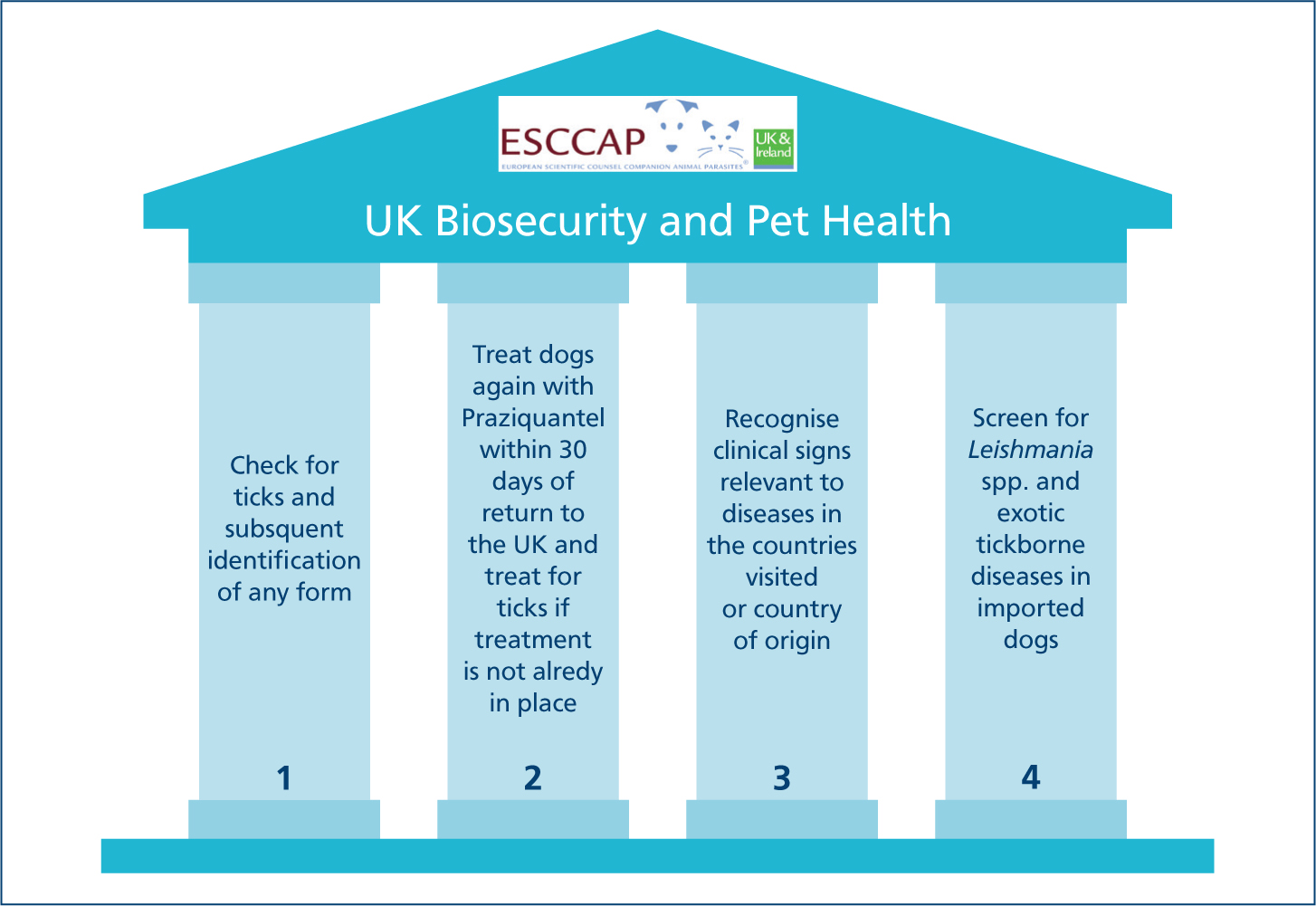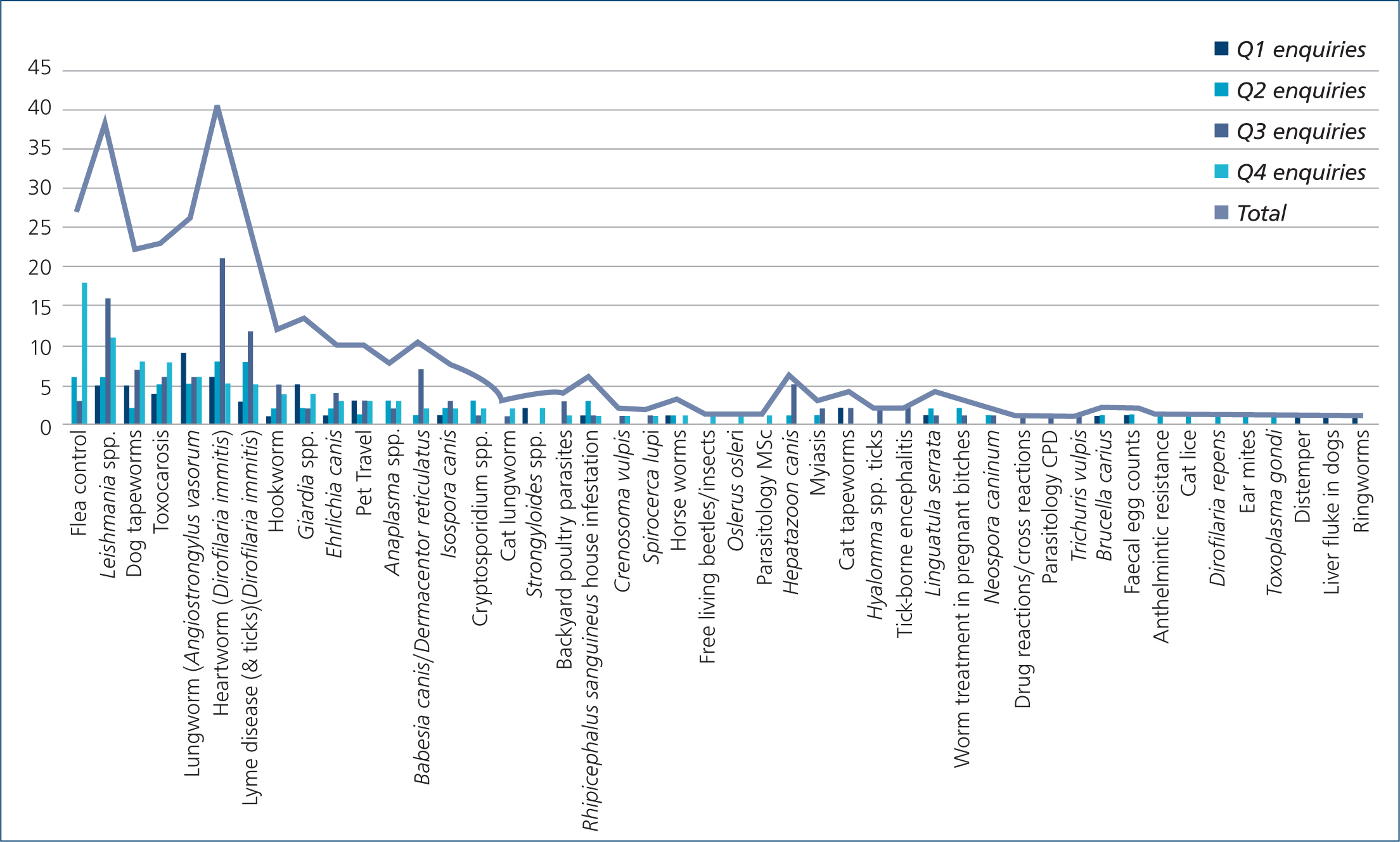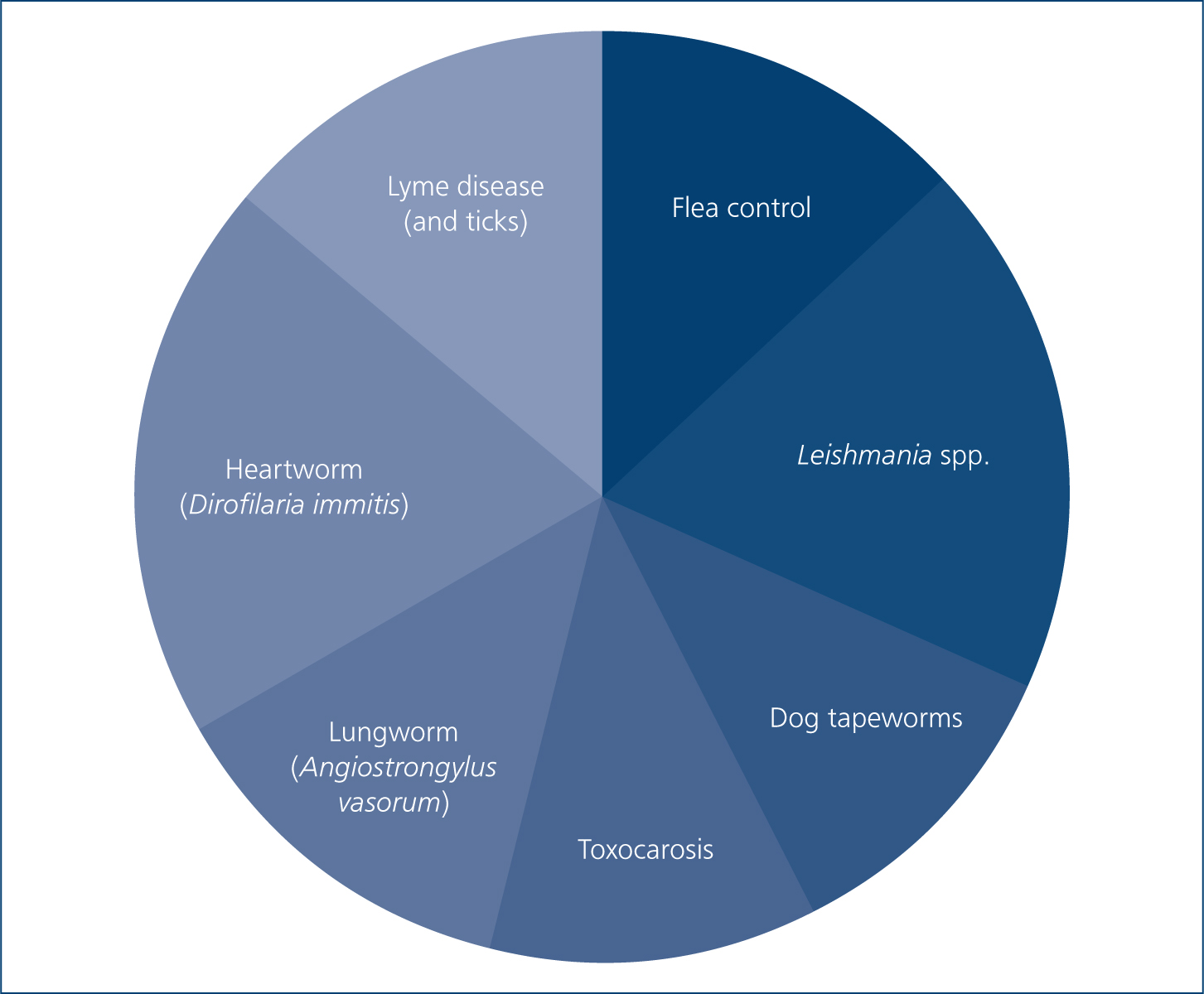This article provides a ‘roundup’ of parasitology related activities and events in 2020. Drawing from information published in the European Scientific Counsel for Companion Animal Parasites (ESCCAP) UK and Ireland parasite forecasts, recently published data and events of note, this article will identify the key themes of 2020 and analyse trends and interest from the public.
Key themes and hot topics
No one could have predicted the hot topics for 2020. We expected a large focus on pet travel as Brexit agreements were confirmed and pet travel legislation was ironed out. The end of 2019 also saw the tick-borne pathogens Babesia venatorum and tick-borne encephalitis confirmed as endemic in the UK, but this has governed little exposure in 2020. Instead, the three big themes of 2020 were:
- An increase in imported pets from abroad harbouring exotic disease
- An increase in cases of Angiostrongylus vasorum lungworm as a result of reductions in routine preventative treatment amidst COVID-19 restrictions
- Suspected environmental contamination of waterways by flea prevention products.
Imported pets during lockdown
With increased globalisation, the number of pets travelling abroad, to and from the UK, has increased year on year. This is a problem in itself, as it greatly increases the risks of introducing exotic parasites into the UK.
However, as pet transportation has become easier, so has the ability to rescue and import pets from abroad. Animal welfare is an evergrowing concern and more and more people are now looking oversees to do their bit to help.
In 2020 we saw large numbers of rescued cats and dogs imported from abroad and the numbers of dogs entering the country with heartworm and Leishmania infantum infections rapidly increased throughout the year.
The adoption or purchases of new pets surged during lockdown as more people were staying at home, prompting the perfect time to introduce and settle a new pet. Many of these pets were imported from abroad.
As well as heartworm and L. infantum, imported pets can harbour a wide range of parasites including tick-borne pathogens, Mesocestoides spp., Dirofilaria repens and Thelazia calliapeda. Many of these parasites are zoonotic, with the potential for establishment in the UK.
The high numbers of imported cases of exotic parasites in 2020 emphasises the need for screening imported dogs for both Leishmania spp. and heartworm, as well as vigilance for relevant clinical signs and early diagnosis of all exotic disease.
ESCCAP UK and Ireland continue to recommend the ‘four pillars’ of biosecurity and pet health in all imported dogs (Figure 1). These are:

- Checking for ticks and subsequent identification
- Treating dogs with praziquantel within 30 days of return to the UK, in addition to the compulsory treatment, and treating for ticks if a tick treatment is not already in place
- Recognising clinical signs relevant to diseases in the countries visited or country of origin
- Screening for Leishmania spp., heartworm and exotic tick-borne disease in imported dogs.
The Royal Society for the Prevention of Cruelty to Animals (RSCPCA) and ESCCAP UK and Ireland have published protocols for assessing cats imported into the UK as rescues from abroad (Whitfield and Wright, 2020). While imported rescue cats are not as common as dogs, there is still the possibility of them introducing exotic pathogens that may affect them, their new owners and UK biosecurity. A consistent approach of clinical examination and testing can help to recognise exotic infection early, and appropriate monitoring or treatment can then be implemented.
The Companion Animal Vector-borne Disease Working Group has also published a consensus statement on the risks of parasite dissemination by rehomed dogs (Wright et al, 2020). ESCCAP UK and Ireland fully supports this position which states that, if at all possible, dogs should be rehomed in their country/region of origin. If this is not possible then surveillance, testing and effectively targeted treatment are key to preventing the spread of parasites.
Veterinary surgeons and veterinary nurses are the first line of defence in educating clients about the risks of importing pets and the importance of minimising the spread of exotic disease. It is important to obtain a travel history for any new pets and to subsequently screen those pets for exotic disease, as well as checking for any evidence of ticks. Finally, it is important to remain vigilant for signs of exotic disease for months, or even years, after travel
Angiostrongylus vasorum lungworm
Thanks to a number of high-profile campaigns, awareness of A. vasorum is better than it used to be, but there is still a long way to go. A recently published study has shown a continuing lack of awareness by dog owners about A. vasorum and the risks it poses to their dogs. An online survey of 1500 dog owners was conducted in April 2019 by Atomik Research for Vets4Pets (Woodmansey, 2019) and the key findings included:
- Half of dog owners are aware of lungworm, but only 13% actually know what it is
- 1 in 10 dog owners are completely unaware of lungworm, and these tended to be younger respondents
- A fifth of dog owners whose pet has had a case of lungworm still are not sure what it was
- Less than a third of dog owners are able to correctly identify that slugs and snails spread the lungworm parasite
- A fifth of pet owners wrongly believe the lungworm parasite is spread by sheep, rats or otters.
This lack of awareness has been exacerbated by the number of first-time pet owners getting dogs during the lockdown periods in 2020. Although most veterinary practices implemented systems to manage consultations and the dispensing of treatments while maintaining social distancing, many pet owners have been reluctant to visit their veterinary surgeon or register new puppies with a veterinary practice. Subsequently, no parasite prevention plan has been set up for those puppies.
In addition, it was reported by veterinary surgeons to ESCCAP UK and Ireland quite early on that routine preventative treatment against A. vasorum and other parasites dropped off as the COVID-19 pandemic took hold, and an increase in angiostrongylosis had been seen as a result. Angiostrongylosis can be fatal for cats and dogs and is an example of how vital routine parasite prevention and treatment is. Every effort should be made to ensure that pet owners continue to follow parasite control programmes.
As well as preventative treatment, effective diagnostic testing is required to rapidly diagnose clinically affected animals across the UK. Testing dogs with relevant clinical signs to confirm A. vasorum infection is also important in order to update preventative advice based on geographic incidence and record high prevalence focal areas of A. vasorum. A variety of tests are available to assist the diagnosis of A. vasorum infection in dogs, including the Baermann technique and antigen testing. While remaining the foundation of lungworm diagnosis, the Baermann technique can now be used in association with more veterinary practice friendly and commercially available antigen tests for A. vasorum infection, which reliably indicate infection (ESCCAP UK and Ireland, 2019).
Environmental contamination
Environmental damage is big concern around the world. As industries push towards decarbonisation and carbon neutral solutions, we are all being asked to be environmentally responsible. Recent articles have identified that some insecticides are causing environmental contamination. Fipronil and imidacloprid contamination have been found in UK water-ways and there are strong suggestions that the source may be flea prevention products. A recent article in the Veterinary Record (Perkins, 2020) discusses this contamination, noting the need for more research to establish the extent to which companion animal flea products contaminate the environment.
Regulatory approval of these products does not currently require a thorough assessment of the environmental impact. However, recent research suggests that products may be contaminating waterways via pet bathing, swimming and washing of items (Perkins, 2020). Further research is needed into all potential sources of waterway contamination including, but not limited to, the veterinary industry. ESCCAP UK and Ireland continues to encourage more research into this, so that environmental contamination can be considered a factor when selecting which flea treatments to use. However, year-round flea treatment for cats and dogs remains essential for the following reasons:
- Exposure to fleas is ubiquitous, with no single group of pets being at significantly decreased risk compared to others
- Exposure occurs all year round and if you wait until flea infestations to establish then they take months to eliminate, resulting in increased morbidity and discomfort for pets and owners, as well as increased zoonotic pathogen exposure
- If veterinary professionals do not recommend year-round flea treatment for cats and dogs then infestations will occur, leading to many pet owners seeking flea products elsewhere, often without correct application advice (such as how to apply without spillage and to avoid swimming, shampooing), leading to more environmental contamination and not less.
Enquiry data
Each year, ESCCAP UK and Ireland provide an enquiry answering service for professionals and the public and produce quarterly reports of the topics raised, to identify possible trends (Figure 2). The trends for the year 2020 have been particularly interesting, as we have faced unprecedented challenges.

January to March 2020 (Q1)
This period saw a big change in trends, with a domestic parasite topping the chart for the first time. Over 16% of Q1 enquiries were regarding A. vasorum lungworm. The reduction in exotic parasite enquiries may be related to the drop in foreign travel associated with the COVID-19 outbreak, as well as there potentially being less travel over the winter period. Lungworm advertising and continuing professional development may be driving A. vasorum awareness, while Giardia spp. enquiries have risen significantly following in influx of giardiosis over the winter and early spring. Interestingly, following the news towards the end of 2019 that the pathogen Babesia venatorum was endemic in the UK, and the subsequent influx of enquiries about Babesia spp., there were no Babesia spp. enquiries in Q1 2020. Instead, these enquiries were replaced in the top five by enquiries about dog tapeworms.
As more cases of rescue dogs infected with D. immitis were encountered by UK veterinary surgeons, ESCCAP UK and Ireland received more enquiries regarding the diagnosis and management of heartworm in imported dogs. This is a trend that followed on from 2019 and ran well into 2020. Early testing and treatment of subclinical carriers improves prognostic outcome and ESCCAP UK and Ireland continues to recommend testing all dogs entering the UK from endemic countries by blood antigen and knotts.
April to June 2020 (Q2)
This period continued to have a domestic focus, with ticks, fleas, A. vasorum and Toxocara spp. roundworm dominating the enquiry chart. However, D. immitis enquiries topped the table in this period. The sudden increase in tick enquiries may have been associated with tick bite awareness week and the increase in tick activity seen at this time of year. There was a noticeable drop in Giardia spp. enquires as the weather finally began to improve and the ground dried out, reducing transmission rates of the protozoan parasite.
July to September 2020 (Q3)
This period saw a record-breaking number of enquiries from veterinary professionals and the public, receiving over 35% of all enquiries for the year. For the first time in 2020, exotic parasites took the top two spots in the table again, with Leishmania spp. and heartworm cases in imported dogs receiving 17% and 13% of Q3 enquiries respectively. This reflects another surge of such cases encountered in practice during this period. Domestic parasites including ticks, and intestinal parasites continued to receive a lot of interest, particularly regarding their control and risk of zoonotic exposure.
October to December 2020 (Q4)
In this period, enquiries reflected the significance of the recent publication of research on environmental contamination with compounds contained in some flea products. Q4 received record breaking numbers of enquiries regarding the need for year-round flea control and people requesting further information on the subject of environmental contamination (nearly 19% of all Q4 enquiries).
Enquiries regarding Leishmania spp. in imported dogs continued to be high (11%), following on from high numbers in Q3. This was likely a result of the large numbers of new pets purchased and adopted in lockdown, many of which came from abroad and then tested positive for leishmaniosis. The high numbers of imported cases emphasise the need for screening imported dogs for Leishmania spp. and other exotic parasites, while also remaining vigilant for relevant clinical signs.
Overall, the 2020 enquiries broke the trend of previous years, whereby exotic parasites have always received the most enquiries. During lockdown we have seen this changing for the first time as travel was restricted. The top enquiry topics for 2020 can be seen in Figure 3. Since 2017, the top enquiry topic has always been Leishmania spp. In 2020 it was knocked into second place (with just under 11% of total enquiries) by D. immitis (11.5%). The next seven ranked enquiry topics are all regarding domestic parasites, finally followed by pet travel, Ehrlichia canis and Babesia canis.

Of particular note was the sharp increase in flea control enquiries in Q4, which received two thirds of all flea control enquiries for the year. The publication of research on environmental contamination with compounds contained in some flea products has led to this record-breaking number of enquiries. ESCCAP UK and Ireland has been happy to discuss these issues and hope that an evidence-based debate on current information and future research will continue.
Conclusions
The year 2020 did not turn out as expected. Aside from the most obvious effects of COVID-19, the veterinary industry, pets and parasites have all been impacted. Parasites have thrived with imported pets and fewer routine parasite treatments. Meanwhile, enquiries took an unexpected turn towards domestic parasites, with flea control, A. vasorum and Lyme disease all topping the chart at one point. As the UK adjusts to the ‘new normal’, ESCCAP is aware that 2021 will be turbulent, as it gets to grips with new Brexit-related pet travel legislation and fights to further protect the UK biosecurity against exotic disease.
Key points
- The year 2020 has seen parasites thrive with many imported pets and fewer routines parasite treatments as a result of COVID-19 restrictions.
- An increased prevalence of Angiostrongylus vasorum lungworm has been observed, as a result of fewer routine preventive treatments being administered.
- As fewer pets have travelled abroad on holiday in 2020, there has been a renewed focus on enquiries regarding domestic parasites.

